Two months.
Two Prime Ministers.
One Head of State.
Zero opportunity to vote for any of them!
There’s something seriously, seriously wrong with the state of our democracy.
Only one solution:
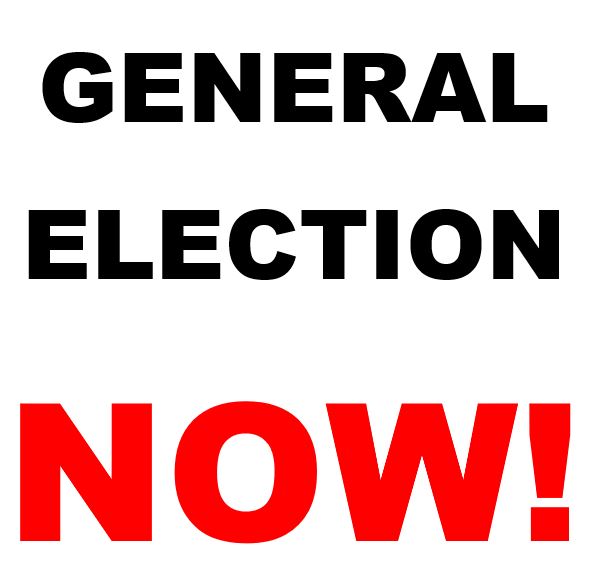
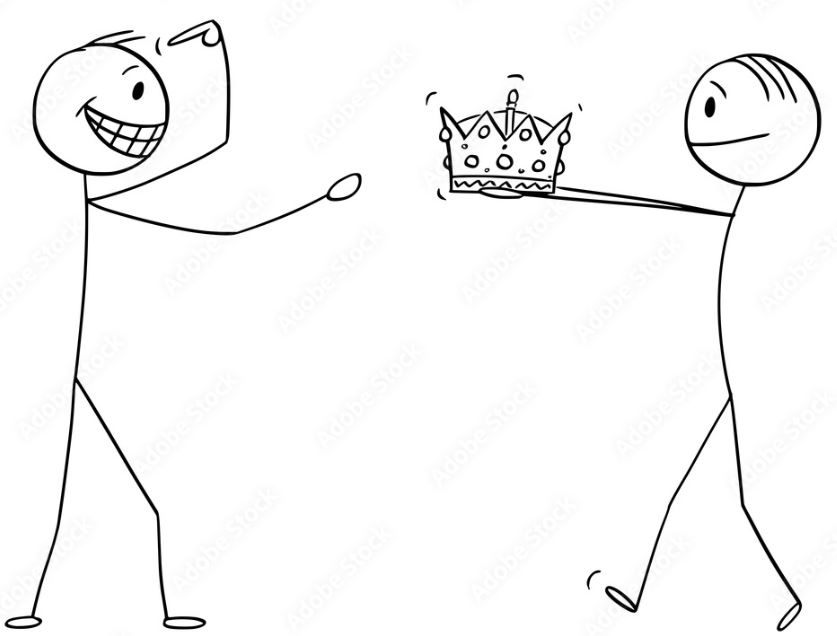
Bhutan, Brunei, Cambodia, Eswatini, Lesotho, Thailand, Tonga, United Kingdom. What do these countries have in common? (How many could you even locate on a globe?)
Well, the common link is not location: four of the non-UK countries are in Asia, two in Africa and one is an island in the Pacific. So, they are quite widely scattered around the world in no obvious pattern.
The only country of comparable size to the UK is Thailand with nearly 70 million people. Next comes Cambodia with nearly 17 million. The rest account for only four and a half million between them, with Lesotho accounting for about half of that figure.
Diversity rules here also. Three countries are majority Buddhist, three majority Christian and one Sunni Muslim. So, religion is not the common link.
Of the world’s 194 countries, the UK is in 26th position in terms of GDP per head of population (PPP rating). Only Brunei’s people are wealthier (9th). All the rest are much poorer, ranging from Thailand in 74th position to Lesotho at 166th.
I’m covering just one such right: the legality of male homosexual acts. In Brunei, such acts are, at least in theory, punishable by death. It’s still illegal, but the law is not enforced, In Eswatini and Tonga and it’s legal in the remaining five countries.
Brunei and Eswatini are absolute monarchies, with Brunei described as “autocratic”. The rest are classified as constitutional monarchies, but with some caveats. Cambodia is de facto a one-party state and Thailand see-saws between “genuine” democracy and military dictatorship: the Thais have the fourth highest rate of military coups in the world. And of course, the Tories have been in power for about two thirds of the time since full adult franchise, despite rarely achieving more than 50% popular support – and never since World War Two.
But we may be on to some connection here: all the countries in the list are monarchies. Getting close, but that’s not the connection. For example, there are still 12 monarchies in Europe, but only the UK is in my list.
The title of this blog post already contains the clue: these are the remining eight countries in the world who still hold coronation ceremonies for their new monarchs. Bhutan goes one step further and has an annual ceremony on the anniversary of the king’s coronation in 2006.
The last coronation in Britain for the previous monarch cost £46 million in 2022 prices. We have been promised a “stripped down” version this time, in a bow to the straitened times we’re living through. But is it really the best way to spend that sort of sum of money when millions are worried about affording to eat or heat this winter? The last coronation elsewhere in Europe took place over 100 years ago. What is it that makes us so backward?
Support for Britain becoming a republic varies over time, in part driven by events involving the royal family. But the latest polls suggest around one third of us want the country to be a republic. Amongst the young, the figures are reversed: amongst 18-24 year olds, support for the monarchy is only 31%. Following the accession without a vote last month, it really seems to be holding two fingers up to that significant minority – majority in the young – to continue, uniquely in Europe, this ludicrous, feudal ceremony. In the name of all that is sane and rational, is holding a coronation the sort of thing a member of the G7 countries should be doing in the 21st century?
Tanked
Not content with nearly tanking the economy with their mini-budget, the Truss government has another little problem with tanks, or rather the lack of them. I’m talking about gas tanks.
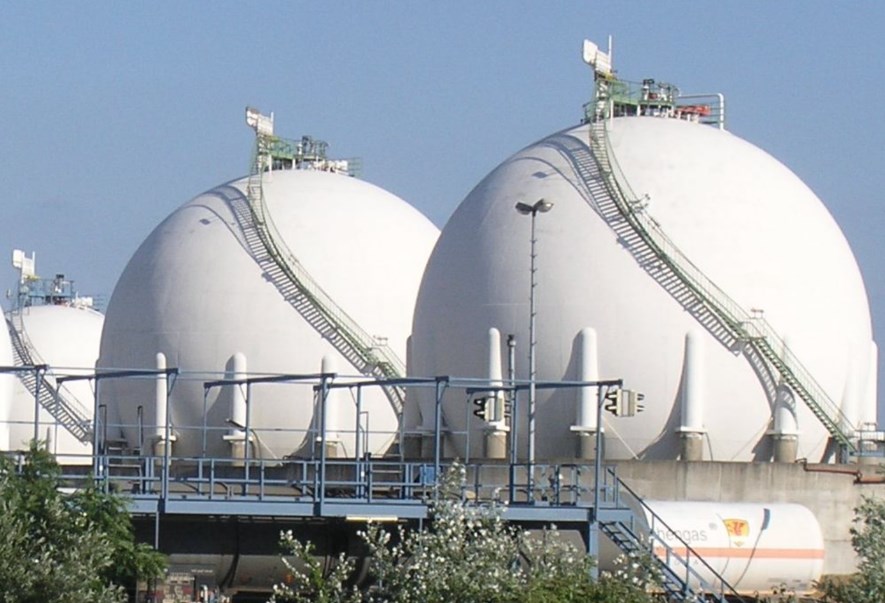
Half a century ago, when Tory Edward Heath was Prime Minister, the country was in turmoil with strikes and protests. One such strike was by the coal miners, at a time when (UK-mined) coal was by far the largest source of energy for electricity generation. People of my age remember the 3-day week accompanied by rolling 3-hour power cuts. The underlying problem was that electricity generators had run down their stockpiles of coal and so put themselves (and the country) in a vulnerable position when the miners went on strike.
Heath called a “who runs Britain?”-themed general election. The voters’ reply was “not you” and Harold Wilson (Labour) became Prime Minister in a hung parliament. Wilson subsequently awarded the miners a 35% pay rise.
You may be thinking: nothing like this could happen now?
Well, obviously no-one (except possibly bankers) would get a 35% pay rise and the top 1% of earners would never settle for so little. But there are some similarities…
Reports in the last 24 hours warn that, in a realistic worst case scenario, rolling 3-hour power cuts may be returning to Britain this winter. So what has changed in the past 50 years?
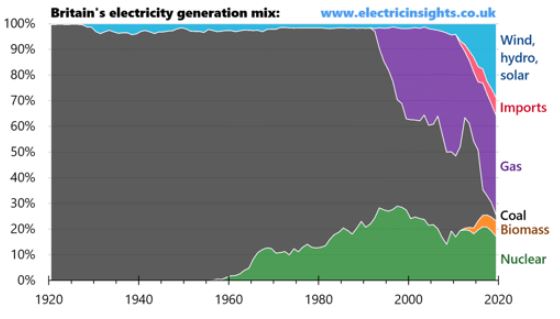
This graph (which covers the last 100 years) shows that, in the 1920s, all our electricity was generated by coal. At the time of the 3-day week, nuclear and a small amount of hydro power had made some incursions, together representing about 10-12% of electricity generated. So the miners still held enormous power over our electricity needs.
The really big changes have occurred in the last 30 years. In the 1990s, gas started to make big inroads into the dependence on coal (the latter by now all imported) and nuclear rose steadily over the 40 years from 1960. The past 10 years has seen a dramatic rise in renewables (wind and solar) and coal has now all but disappeared from the mix. Renewables now account for around 30% of electricity generated, the big rise being mainly in offshore wind. The much cheaper onshore wind saw its rise dramatically halted in 2015 by Tory changes to planning rules and NIMBY local authorities. It’s interesting to note that direct electricity imports (by cable), although still small, only feature in the mix from around 12 years ago. (Biomass remains controversial, with sharply differing opinions as to whether or not it can be considered “green”. I think not.)
Our current mix of electricity generation looks like this (figures for August 2022):
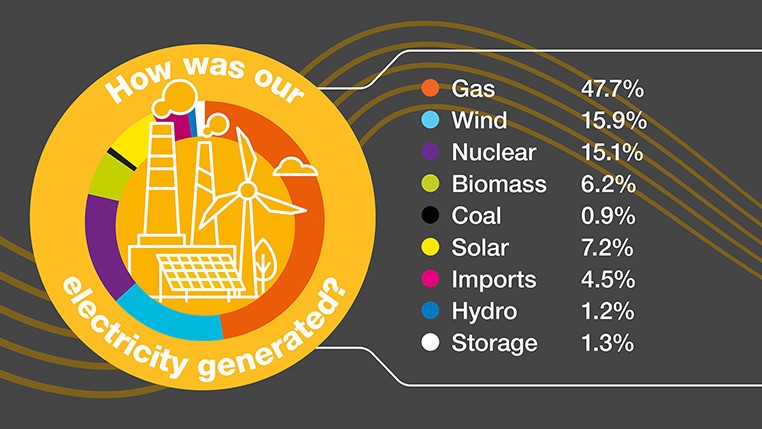
Gas still dominates: nearly half our electricity comes from gas, which is why it features strongly in the energy price. Coal has all but disappeared, but may make an unwelcome comeback to get us through the winter. “True” renewables (wind, solar, hydro) make up about a quarter, nuclear around 15% – and note that imports account for about 5%.
The government is correct to identify the Russian withdrawal of gas from world markets as the biggest disruptive effect to global gas supply. We import around 60% of our gas consumption (as both a fuel and for electricity generation) and export around 20%.
But there are 3 areas in which the UK has shot itself in the foot:
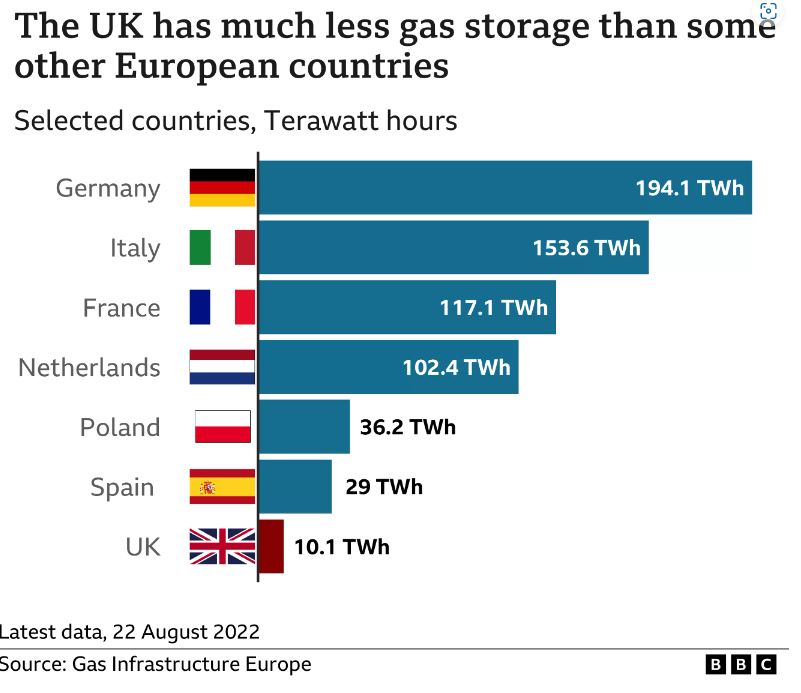
EU countries with ample gas storage facilities have been filling these over the summer months to provide a buffer stock for the winter. Currently, gas stored across the EU is at 90.4% of capacity, representing just over 3 months’ demand. By contrast, the UK’s tiny storage facility is 99% full, representing just four and a half days’ demand.
Go figure. And they say history does not repeat itself.
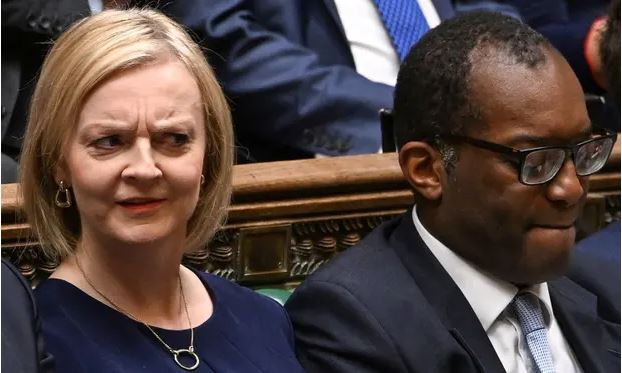
Have you noticed that Truss and her Cabinet colleagues have a new favourite phrase? It goes: “I do not accept the premise of your question.” They use it as a rhetorical ruse when they do not wish to answer a question.
So let’s talk about premises: specifically false premises.
A full 14 years after it imploded spectacularly in 2008, it seems the “old-time religion”, free market fundamentalism, is back in vogue. One of its key ideas is that of “trickle-down” economics, which is dependent on the two false premises of FMF. It is surely tragic that we have allowed our government to regress to such crazy ideas.
At risk of the old adage “I told you so”, I demonstrated, with evidence, in a post seven years ago: Inequality Damages Your Wealth, that so-called trickle-down economics is a myth. There’s a considerable amount of evidence to show that policies now advanced by the Truss government will not increase growth – quite the opposite.
Also from 2015, in a post entitled Two Castles (part 2), I spelled out the false premises upon which Truss’s economic philosophy depends. Truss’s assertions about growth depend on these implicit and false assumptions:
It seems unbelievable that the mistakes of the Thatcher / Reagan era are to be repeated. Unbelievable, but perhaps not unexpected, given that Truss and Kwarteng were two of the co-authors of the notorious book Britannia Unchained, with its assertion about Britain’s “laziest” workers. The book makes clear its authors’ admiration for Thatcher and for those who influenced her thinking: Friedrich Hayek and the novelist Ayn Rand.
So here we are. How long do we have to put up with this return to a failed ideology? (Here’s a view from across the pond.) Perhaps not long, given Truss’s unpopularity in the opinion polls: Tory MPs appear to be spooked by this. Only a week and a half after “normal” politics resumed following the official mourning period, Chancellor Kwateng’s unforced error landed us with a bill of £65 billion to be added to our national debt. How much more damage can they do before we kick them out of office?